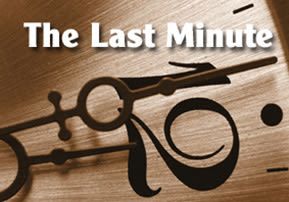
The Last Minute
It’s never too late, even in the last minute, in the final second. Even after uncounted failures, a person can, if he wants, emerge victorious at the end of the game.

Part 10 of “The Journey,” by Erez Moshe Doron: an elaboration of Rebbe Nachman’s famous tale of “The Rabbi and the Only Son”
They returned to their home. A short while afterward the son died.
The hero is already not so young. After many delays the situation has reached the point that the son dies. In this story the common Hebrew terminology for death is used. It also means that the son has become exempt from his obligations. The crying of his soul is now completely hidden from his attention.
He has been burned out. His thoughts and emotions have been patterned for many years into a particular mold, and in this pattern there was no room for spirituality.
The son came to the father in a dream.
Nevertheless, until a person dies the soul within him is still alive. There is still some revelation to the father representing the intellect, but it is very weak and unclear as in a dream.
The father saw that his son was very angry….
This is no longer a feeling of vague deficiency or yearning as when the son previously came to the father. Now it is rage.
This anger is an expression of bitter frustration for all the years which have been wasted, for all the spiritual accomplishments which could have been achieved but will never be attained now, for a whole life which has passed incidentally and without purpose.
Now, in the evening of a person’s life the blotches on the body and soul have multiplied. The sparkling materialism has dimmed. The dreams of a career, wife, children and a house are behind him. Before him yawns the gaping abyss. At that time a person begins to feel with increasing force the emptiness of the spiritual part that he never troubled to fill.
…And he asked him, “Why are you so angry?”
In general, a person does not understand the reason for this bitterness or its source.
The son answered him, “Journey to that holy man whom I wanted to reach. He will tell you the reason for my anger.”
If you would meet a person who understands spiritual reality and your need for it, then you would understand the reason for this bitterness.
…He made the journey. Along the way he met the merchant…. The merchant answered him, “Certainly it was me who you saw.” He opened his mouth and said, “If you want, I will swallow you.”
There is an apparent difficulty here. If the merchant (the evil inclination) has the power to swallow him, then it would seem that a person never had a choice or a chance!
However, the actual words of the evil one are, “If you want….” It still depends on the person’s free will. This teaching reveals one of the most powerful ideas appearing in the writings of Rabbi Nachman.
It is never too late, even in the fifty-ninth minute, even on the threshold of death. Even after uncounted failures, a person can, if he wants, shake off the accumulated heaviness of his life. With a new spirit of youth and vitality he can find the spiritual purpose.
Of course, one who awakens when he is still in his youth and in the vigor of life is not comparable to one who awakens when he is no longer young. Nevertheless, a person always has enough strength to surge forward, if he wants. On the other hand, if he chooses, the evil inclination can swallow him totally and finally. But if he chooses to resist it, then it can never overcome him.
“Do you remember? When you first journeyed with your son the horse fell down on the bridge….”
The merchant reveals his true identity. He is none other than the “angel of death” himself. He kills the body and the soul together. It is the culminating role of the evil inclination.
“Your son had attained the level of ‘the small lamp,’ and the holy man he wanted to reach is the level of ‘the great lamp’.”
The secret is finally revealed. Why has the “merchant” troubled himself in so many ways to prevent this person from meeting his true spiritual guide? Why does he try so hard to stop the sun shining upon the moon? Why does he put so many obstacles in the way to block a Jew meeting G-d’s Torah and filling his life with light?
“If they had come together, then messiah would have come.”
The concept of messiah is inextricably connected to the concepts of redemption and exile. Actual physical redemption implies that a person is far from his home and separated from the place that is good for him. In the same way, a person can experience spiritual exile in his psyche and be separated from his soul, as we have seen in our story. A person may find himself far from his “house” — his wholeness and spiritual perfection.
The messiah is the leader who redeems. In other words, he takes the nation of Israel out of spiritual and physical exile. Similarly, each person has a personal messiah. Everyone has the opportunity to fulfill his destiny as a Jew and to live a life full of spiritual content and meaning. He will have been redeemed, at least personally, as if his personal messiah had come.
Moreover, every individual who is thus redeemed brings closer the collective redemption for which we are all waiting and which depends upon me and upon you.
***
With sincere gratitude to www.levhadvarim.com











Tell us what you think!
Thank you for your comment!
It will be published after approval by the Editor.